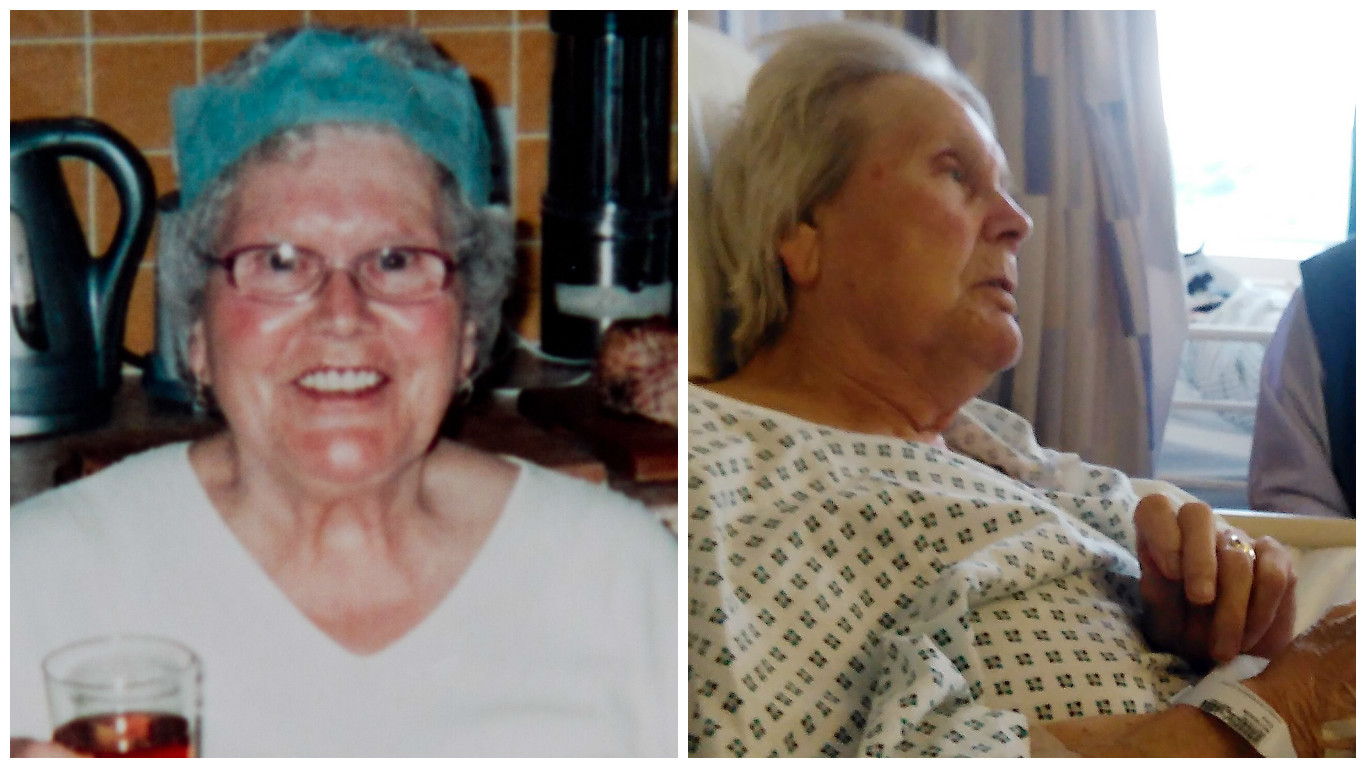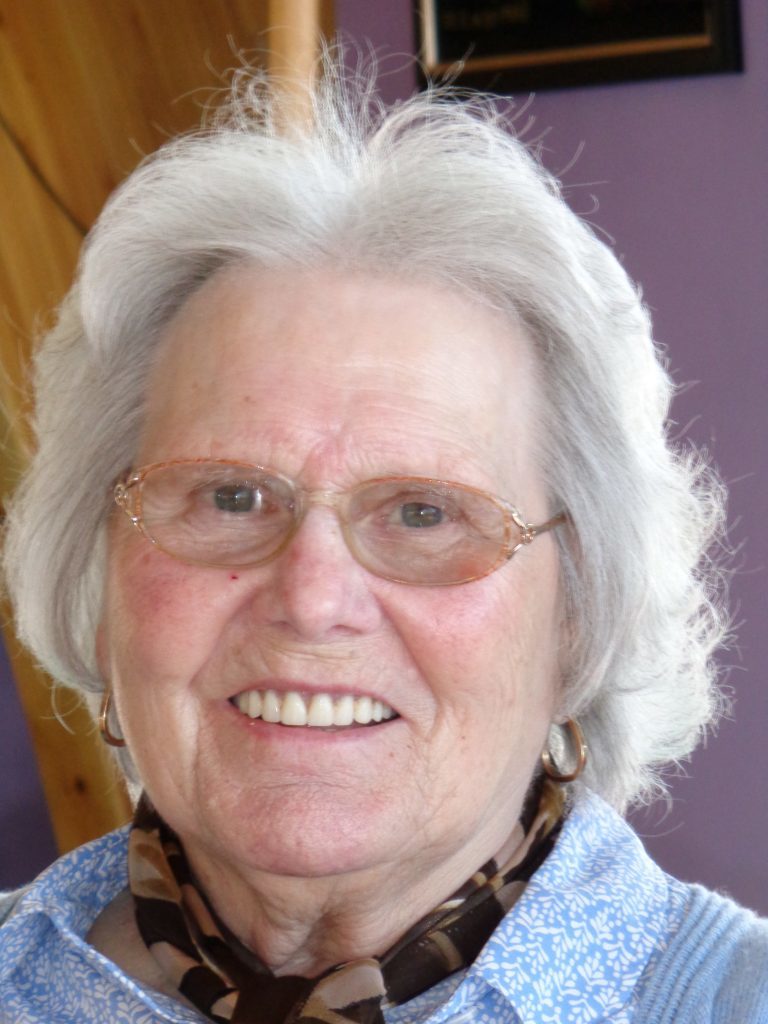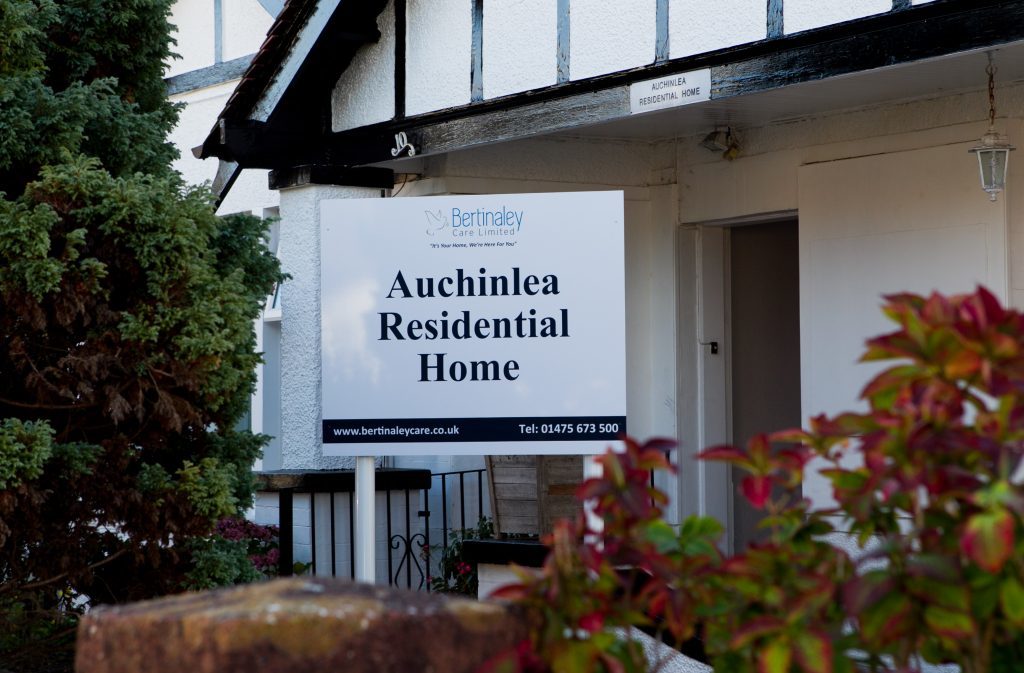
SHE worked hard all her life and dotes on her family.
At 85, selfless Alice Morrison should have been enjoying and reflecting on a life well lived.
Instead she was forced to endure 12 days of torment at a care home where she suffered a bruised face and two falls – one trip after staff removed her glasses.
According to the home, her spectacles were removed because she had been “tampering with the frame” and they feared for her safety.
But this – coupled with an allegation staff gave her a walking stick that was far too short – led to her suffering a fall in May.
She needed emergency treatment for a broken femur. But her condition was so severe, it took medical staff five days to stabilise her before they could operate.
In total she had to stay in hospital for 32 days.
Disturbingly – in what has been upheld as a poor example of treatment at a private care home – The Sunday Post can also reveal:
- She suffered one fall within hours of entering the home, but staff gave conflicting accounts over whether it had left Alice bruised or not.
- No staff member had undertaken recent “falls training” and there was no practical element to their first aid training.
- The family were not consulted over the decision to confiscate her glasses.
Alice’s son Barry, 52, of Carnwath, Lanarkshire, is furious at the treatment she received.
“Mum ended up seriously injured. Not helped because she had her glasses taken from her,” he said. “She was vomiting, pale and in agony when she was eventually admitted to hospital.”
Barry’s anger at his mum’s stay at the Auchinlea Care Home in Largs, North Ayrshire, comes on the back of an equally scathing report into the establishment by the Care Inspectorate watchdog body.
“She is a caring gran who devoted her life to her family,” he said. “But she was robbed of her dignity.
“She went in as a happy, trusting grandmother with dementia and left distressed, wracked with pain and in tears.
“It is shocking what she went through and we do not want any other frail, elderly person to ever be treated like this.”
In its report, the Care Inspectorate found Alice’s glasses were most likely removed for “safety reasons”.
Despite this, the home’s care plan contained no information “to clarify safety issues regarding glasses” and it concluded: “We were not confident that staff took sufficient action to prevent falls.
“In particular, a decision to remove glasses from Mrs Morrison greatly increased (the) falls risk.”
“I was stunned to discover Mum had her glasses taken from her, especially when she really needs them,” Barry added. “Staff told us they were taken from her because she played with the lenses, something she’d never been known to do.
“Her walking stick disappeared as well, only for it to be replaced with one that was too small to use.
“It’s shocking that we have care homes which leave our most vulnerable at the mercy of such failings.”
Desperate to seek out the truth of his mum’s 12-day stay, Barry called in the Care Inspectorate to investigate.
He was concerned about his mum’s welfare and an apparent lack of clarity about her care plan.
The Care Inspectorate report found a worker phoned Mrs Morrison’s family to say there had been an accident shortly after she moved in. She said she had no bruise on her forehead.
But the same worker – in a call to NHS 24 – contradicted what the family were told, saying: “She has a wee bruise on her forehead and is asking for paracetamol.”
The lack of clear communication was one of the family’s biggest gripes, said exasperated son Barry.
Care Inspectorate staff visited the home four times as part of its investigation, including a 1am surprise visit. It spoke to a number of staff, including the manager, two senior supervisors and four senior carers.
In total, six different aspects of the family’s complaint were investigated by the body, and all of them were upheld, resulting in a raft of recommendations being imposed on the home, run and operated as part of chain owned by Bertinaley Care Limited, headquartered in Edinburgh.
The key complaints – that the home failed to take action to prevent falls and that inaccurate and conflicting information was provided to the family – led to a number of key recommendations being put forward.
Auchinlea has been told to train staff to carry out first aid, ensure staff can cope well to prevent and cope with falls, look after residents’ belongings, keep accurate records of patients’ care and keep families accurately informed.
Alice, a well-known Largs figure and former school support worker, was cared for by husband Ricky, until his health made the task too difficult. The decision was then taken that Alice – who has
dementia – could be best cared for in a private care home.
But the family have been left to rue their choice of home, given her experience at Auchinlea.
Barry added: “All this has been distressing. They are a devoted couple who worked all their days, Dad in a power plant, Mum at a school. They deserved none of this.”
Alice has now been moved to a different care home.
In a letter of apology to the family, Auchinlea’s assistant operations manager, Rory Nicoll enclosed a £200 cheque for a missing walking stick.
The home also issued a statement to The Sunday Post outlining how it had taken on board the recommendations highlighted by the Care Inspectorate.
It said all of these have been addressed, “and of course we have apologised to the family”.
A spokesperson for the Care Inspectorate said: “This was a serious case and we have looked into the concerns brought to us.
“We have made clear to the care home the areas which must improve swiftly to ensure that the care provided to residents meets the standard they have a right to expect, and are working closely together to ensure this happens.
“Everyone in Scotland has the right to care which meets their needs and respects their rights.”
Factfile
WHEN choosing a care home for yourself or a relative, check to see if there are enough staff to give round-the-clock care.
Ask if staff are all first aid trained and find out what the safety procedures are in case of an emergency.
Check to make sure the home is clean and tidy and staff are friendly to patients.
Ask what the home’s policy is on suspected abuse.
Older adults who are victims of abuse often look and behave differently – they could be quick to anger, or are quiet and depressed.
It is also important to look out for bruising or injuries in the same place.
They could have lost a lot of weight or look dirty.
If you believe a relative is being abused in a care home, talk to them in private.
If you think that they are in immediate danger, call the police on 101.
But if it is non-urgent, contact their GP or social worker.
You can also call Action On Elder Abuse on 0808 808 8141.
In my view: Lesley Carcary, Campaigner
WHAT happened to Alice Morrison is an unfortunate example of a type of care that is all too common for older people in Scotland.
She should have felt safe and cared for in her new home. Instead, she ended up in hospital.
Sadly, Alice’s case is indicative of the ageism that pervades society.
An estimated 42,000 older people in Scotland suffer some form of abuse every year, ranging from psychological torment and neglect to thefts, beatings and even rape.
While some of this abuse takes place in institutional settings, the disturbing truth is that it’s more likely to occur in people’s own homes. In many cases, the victim knows the perpetrator.
All too often, victims aren’t getting the justice they deserve.
We’re fortunate to be in the only country in the UK with legislation which requires public bodies to report suspected cases of abuse.
But this can only go so far.
We need to ensure that perpetrators are legally held to account.
And we need to create much more awareness of the problem across society, to truly get to grips with elder abuse.
Lesley Carcary is director of Action On Elder Abuse Scotland
READ MORE
Scandal of rising abuse in care homes with more than 1600 allegations in one year

Enjoy the convenience of having The Sunday Post delivered as a digital ePaper straight to your smartphone, tablet or computer.
Subscribe for only £5.49 a month and enjoy all the benefits of the printed paper as a digital replica.
Subscribe

